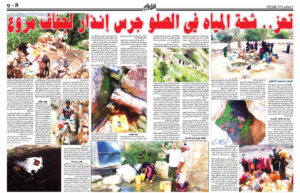Copied from International Journalists' Network, written by me Rahma Diaa Link to the original article published on April 15, 2024 here
“Environmentally friendly”, “sustainable”, “green”... terms that have become used for the purpose of promotion and advertising in various fields, and to deliver encouraging messages to consumers. They do not always express the reality of the advertised product, which puts them in the category of “green claims” or what is known as With “green washing”.
And “greenwashing” according toCambridge Dictionary Behaviors or activities that make people believe that a company is doing more to protect the environment than it actually is.
The term (Green Washing) is derived from a word from Washing, meaning “washing,” referring to “brainwashing,” and was first coined by an environmentalist. Jay Westerfield In a 1986 article he claimed that the hotel industry falsely promoted towel reuse as part of an environmental strategy when in fact it was a cost-saving measure used.
Greenwashing, or what is known as “green claims,” represents an obstacle to addressing climate change. Because it depends United nations “It misleads the general public and promotes false solutions to the climate crisis that serve to distract from concrete, credible action. “Through deceptive marketing and false claims about sustainability, greenwashing misleads consumers, investors and the general public, and hampers the confidence, ambition and action needed to create global change and secure a sustainable planet.”
Greenwashing includes several tactics, some of which are more obvious than others United nations Which:
- Claiming that you are on track to reduce a company's polluting emissions to net zero when no reliable plan actually exists.
- Being intentionally vague or non-specific about company operations or materials used.
- Intentionally applying misleading labels such as “green” or “eco-friendly,” which do not have standardized definitions and can be easily misinterpreted.
- Implying that a small improvement has a big impact or promoting a product that meets minimum regulatory requirements as if it is significantly better than the standard.
- Emphasizing one environmental characteristic while ignoring other influences.
- Required to avoid illegal or non-standard practices unrelated to the product.
- Communicating the sustainability attributes of a product in isolation from brand activities (and vice versa) – e.g. Clothes made from recycled materials are produced in a high-emitting factory that pollutes the air and nearby waterways.
To address greenwashing, the UN Secretary-General established a high-level expert group tasked with setting stronger and clearer standards for net-zero emissions pledges by companies, financial institutions, cities and regions, and accelerating their implementation. The expert group identified in a report entitled “Integrity is important“, make several recommendations on credible and accountable pledges to net zero emissions and detail the considerations needed for each stage towards achieving net zero emissions and tackling the climate crisis.
There are several countries that began years ago to criminalize the phenomenon of green washing and restrict companies and entities that do this, for example Australia AndCanada AndEuropean Union AndUnited States of AmericaThe matter sometimes amounts to financial fines amounting to millions of dollars paid by companies found guilty of greenwashing practices, and the total number of cases brought before the courts regarding climate change has more than doubled globally since 2017, according to “Global Climate Litigation Report: 2023 Status Reviewpublished by the United Nations Environment website, and the number reached 2,180 cases in 2022 instead of 884 in 2017. The report indicated that conflicts fall into 6 categories, and one of these categories is: calling for more disclosure of climate-related information and putting an end to greenwashing. .
There are some things that can help discover and suspect greenwashing practices by companies, according to the website Greenwashing indicator Which:
- Companies make exaggerated claims about the environmental benefits of the product.
- Use deceptive visual elements such as green colors and nature images.
- Using vague language and exporting words like “eco-friendly,” “green,” and “natural” without providing clear definitions of what is meant by that.
- Placing symbols or logos on packages that resemble reliable certificates to give the illusion of credibility.
- Lack of context and failure to provide information about industry standards, guidelines and comparisons with alternative products.
The same website refers to several industries in which green claims and greenwashing practices abound, namely: the food industry, cars, cosmetics, fashion, and energy. It offers several tips for verification:
- Look for evidence to verify purported environmental promises and ask what exactly the buzzwords used mean instead of falling for unsupported assertions, especially when you find a company exaggerating environmental claims and providing little information about the product's actual performance and benefits to consumers.
- Verify the legitimacy of any certificates or labels on products by researching their origins and authenticity and that they are not imitations of established environmental certifications.
- Pay attention to a company's overall sustainability efforts and research its history and other activities, not just the specific product that claims to be environmentally friendly.
- Think about what you have not been told, and collect information about how easily the product can be recycled at the end of its life, how the manufacturing, packaging and transportation process takes place and whether environmentally friendly practices are followed in the various steps of the manufacturing process. Ask all these questions to the company and demand transparency.
- Keep up to date with industry developments, environmental reports, sustainability reports, and news related to greenwashing scandals.
The following websites can help journalists track many of the activities of greenwashing companies and monitor their commitment to environmental promises and pledges:
- Green washing index
- New climate institute
- Carbon Market Watch
- Action climate tracker
- Energy tracker
- Climate watch
- Climate action
- Global energy monitor
- Clean Energy Wire
For example, you can find many regulatory reports that evaluate the environmental performance of companies and the extent of their commitment to their green pledges. Some sites also publish lists of the most prominent greenwashing companies annually in various sectors, such as these the list Posted by the site Energy tracker Asia Titled “The Ten Leading Greenwashing Companies for 2022.”
You can also refer to the following sites that periodically conduct fact checks and expose green claims:
- Climate fact check
- Fact check
- Climate feedback
- Verificat
- Daily climate denial
- Ask NASA climate
- Carbon brief
Here are several things that it is recommended to pay attention to when preparing press reports to expose green claims and greenwashing practices:
- Avoid making accusations without conclusive evidence to avoid legal accountability. It is preferable to obtain legal advice before publishing extensive investigations that reveal corporate violations.
- State the claim in a separate paragraph at the beginning of the report, with a subtitle explaining that this is a misleading claim or incorrect information when writing “post-publication correction” reports.
- Find answers to these questions: Who is behind the spread of these green claims? What is motivation and interest? How do we verify its authenticity?
- Use evidence, studies, and reliable sites for data.
- Refer to the reports published by regulatory authorities and monitoring sites that expose environmental violations and violations by companies.
- Search fact-checking sites and expose misleading claims.
- Connect directly with researchers, scientists, and specialists in your research topic to get answers and respond to companies' claims.
- Avoid false objectivity and give equal space to both teams.
- Use simple language and explain and explain any term that may be difficult for a non-specialized reader to understand.
- Use pictures, graphs, maps, and explanatory videos in your report.
- Write a summary paragraph at the end of the report that includes the most important findings you made.
Press examples:
Greenwashing: Is this Brazilian paper company sustainable?
Greenwashing Terms in Fashion: What 'Circular', 'Sustainable' and 'Zero Waste' Really Mean.
New measures - The European Union seeks to combat the phenomenon of “greenwashing.”“.
Main photo from COP 27 in Sharm El Sheikh - Photography by Rahma Diaa.





